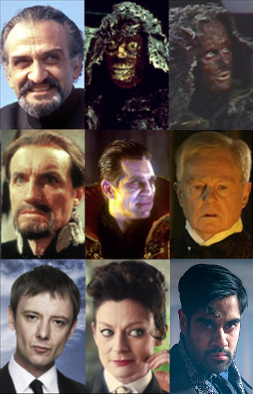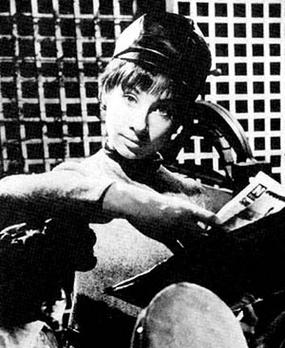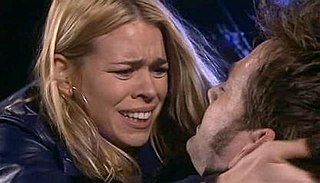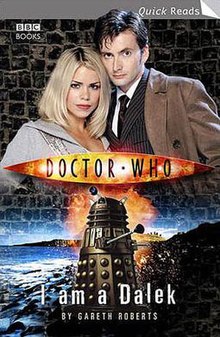
Gallifrey is a fictional planet in the long-running British science fiction television series Doctor Who. It is the original home world of the Time Lords, the civilisation to which the protagonist, the Doctor belongs. It is located in a binary star system 250 million light years from Earth.

The Time Lords are a fictional ancient race of extraterrestrial people in the British science fiction television series Doctor Who, of which the series' main protagonist, the Doctor, is a member. Time Lords are so named for their command of time travel technology and their non-linear perception of time. Originally, they were described as a powerful and wise race from the planet Gallifrey, from which the Doctor was a renegade; details beyond this were very limited for the first decade of the series. They later became integral to many episodes and stories as their role in the universe developed. For the first eight years after the series resumed in 2005, the Time Lords were said to have been destroyed during the Last Great Time War at some point in the show's continuity between the original series' cancellation in 1989 and the show's revival. In 2013, the 50th anniversary special "The Day of the Doctor" concerned this supposed destruction and their eventual survival.

The Master, or Missy, is a recurring character in the British science fiction television series Doctor Who and its associated spin-off works. They are a renegade alien Time Lord and the childhood friend and later archenemy of the title character, the Doctor. They were most recently portrayed by Sacha Dhawan.

Susan Foreman is a fictional character in the British science fiction television series Doctor Who. The granddaughter and original companion of the First Doctor, she was played by actress Carole Ann Ford from 1963 to 1964, in the show's first season and the first two stories of the second season. Ford reprised the role for the feature-length 20th anniversary episode The Five Doctors (1983) and the 30th anniversary charity special Dimensions in Time (1993).

Sarah Jane Smith is a fictional character played by Elisabeth Sladen in the long-running BBC Television science fiction series Doctor Who and two of its spin-offs. Sarah Jane is a dogged investigative journalist who first encounters alien time traveller The Doctor while trying to break a story on a top secret research facility, and subsequently becomes his travelling companion on a series of adventures spanning the breadth of space and time. After travelling with The Doctor in four seasons of the show they suddenly part ways, and after this she continues to investigate strange goings-on back on Earth. Over time, Sarah Jane establishes herself as a committed defender of Earth from alien invasions and other threats, occasionally reuniting with The Doctor in the course of her own adventures, all the while continuing to work as a freelance investigative journalist.

The Doctor is the title character in the long-running BBC science fiction television programme Doctor Who. Since the show's inception in 1963, the character has been portrayed by thirteen lead actors. In the programme, "the Doctor" is the alias assumed by a millennia-old humanoid alien, a Time Lord who travels through space and time in the TARDIS, frequently with companions. The transition to each succeeding actor is explained within the show's narrative through the plot device of "regeneration", a biological function of the Time Lord race that allows a change of cellular structure and appearance with recovery following a fatal injury.

Rose Tyler is a fictional character in the British science fiction television series Doctor Who. She was created by series producer Russell T Davies and portrayed by Billie Piper. With the revival of Doctor Who in 2005, Rose was introduced as a new travelling companion of the series protagonist, the Doctor, in his ninth and tenth incarnations. The companion character, intended to act as an audience surrogate, was key in the first series to introduce new viewers to the mythos of Doctor Who, which had not aired regularly since 1989. Rose became the viewers' eyes into the new world of the series, from the companion's perspective. Piper received top billing alongside Christopher Eccleston and David Tennant for the duration of her time as a regular cast member. A regular for all of series one (2005) and series two (2006), Piper later returned for three episodes of the programme's fourth series (2008) and appeared in feature-length specials in both 2010 and 2013. In the latter, Piper played a sentient weapon known as 'The Moment', which utilises Rose's image.

The Tenth Doctor is an incarnation of the Doctor, the main protagonist of the BBC science fiction television franchise Doctor Who. He is played by David Tennant in three series as well as nine specials. As with previous incarnations of the Doctor, the character has also appeared in other Doctor Who spin-offs. Tennant's time as the Tenth Doctor is highly regarded among fans of the show and is generally regarded as one of the most iconic incarnations of the character, often ranked alongside Tom Baker's Fourth Doctor.

Mickey Smith is a fictional character portrayed by Noel Clarke in the British science fiction television series Doctor Who. The character is introduced as the ordinary, working class boyfriend of Rose Tyler, a London shopgirl who becomes a travelling companion to the Ninth and Tenth incarnations of an alien Time Lord known as the Doctor. Mickey first appears in the first episode of the 2005 revival, "Rose". Initially someone who struggles in the face of danger, Mickey nevertheless acts as an Earth-based ally to the Doctor and Rose. In the second series he joins the pair as a second companion of the Doctor's, though he leaves during the 2006 series to pursue his own adventures. He returns to aid the Doctor and Rose in the series finale later that year, and then again for the 2008 finale "Journey's End," as well as fleetingly in 2010 in the Tenth Doctor send-off "The End of Time".
"The Parting of the Ways" is the thirteenth episode and the season finale of the revived first series of the British science fiction television programme Doctor Who. The episode was first broadcast on BBC One on 18 June 2005. It was the second episode of the two-part story. The first part, "Bad Wolf", was broadcast on 11 June.

The First Doctor is an incarnation of the Doctor, the fictional protagonist of the BBC science fiction television series Doctor Who. He was portrayed by actor William Hartnell.
"The Christmas Invasion" is a 60-minute special episode of the British science fiction television series Doctor Who, which was first broadcast on BBC One on 25 December 2005. This episode features the first full-episode appearance of David Tennant as the Tenth Doctor and is also the first specially produced Doctor Who Christmas special in the programme's history.
The Daleks are a fictional extraterrestrial race of mutants from the British science fiction television series Doctor Who. The mutated remains of the Kaled people of the planet Skaro, they travel around in tank-like mechanical casings, and are a race bent on universal conquest and destruction. They are also, collectively, the greatest alien adversaries of the Time Lord known as the Doctor, having evolved over the course of the series from a weak race to monsters capable of destroying even the Time Lords and achieving control of the universe.
The Time War, more specifically called the Last Great Time War, is a conflict within the fictional universe of the British science fiction television series Doctor Who. The war occurs between the events of the 1996 film and the 2005 revived series, with the Time Lords fighting the Daleks until the apparent mutual destruction of both races. The war was frequently mentioned when the show returned, but was not directly seen until the show's 50th anniversary special.
In the long-running British science fiction television series Doctor Who, regeneration is a biological ability exhibited by the Time Lords, a race of fictional humanoids originating on the planet Gallifrey. This process allows a Time Lord to undergo a transformation into a new physical form and a somewhat different personality after instances which would normally result in death. Regeneration has been used multiple times throughout the history of the show as a device for introducing a new actor for the lead role of its main character, the Doctor. Other Time Lords and similar characters have also regenerated, usually for narrative reasons, rather than casting.
In the long-running BBC television science fiction programme Doctor Who and related works, the term "companion" refers to a character who travels or shares adventures with the Doctor. In most Doctor Who stories, the primary companion acts as an audience surrogate. They provide the lens through which the viewer is introduced to the series. The companion character often furthers the story by asking questions and getting into trouble, or by helping, rescuing, or challenging the Doctor. This designation is applied to a character by the show's producers and appears in the BBC's promotional material and off-screen fictional terminology. The Doctor also refers to the show's other leads as their “friends" or "assistants"; the British press have also used the latter term.

"Journey's End" is the thirteenth and final episode of the fourth series of the British science fiction television series Doctor Who, which was first broadcast on BBC One on 5 July 2008. It is the second episode of a two-part crossover story featuring the characters of spin-off shows Torchwood and The Sarah Jane Adventures, preceded by "The Stolen Earth", which aired on 28 June. At 65 minutes in length, it was approximately 20 minutes longer than a standard fourth-series episode. It marked the final regular appearances of every companion introduced in the Russell T Davies era, including Catherine Tate as Donna Noble.

"The Stolen Earth" is the twelfth episode of the fourth series and the 750th overall episode of the British science fiction television series Doctor Who. It was first broadcast on BBC One on 28 June 2008. The episode was written by show runner and head writer Russell T Davies and is the first of a two-part crossover story with spin-offs Torchwood and The Sarah Jane Adventures; the concluding episode is "Journey's End", the finale of the fourth series, broadcast on 5 July.

The Ninth Doctor is an incarnation of the Doctor, the protagonist of the BBC science fiction television programme Doctor Who. He is portrayed by Christopher Eccleston during the first series of the show's revival in 2005. Within the series' narrative, the Doctor is a centuries-old alien Time Lord from the planet Gallifrey who travels in time and space in the TARDIS, frequently with companions. At the end of life, the Doctor regenerates; as a result, the physical appearance and personality of the Doctor changes. Eccleston's Doctor was a war-torn loner who disguises his trauma brought on by the Time War using a sense of humour and determination to protect the innocent. The production team's approach to the character and Eccleston's portrayal were highlighted as being intentionally different from his predecessors, with Eccleston portraying the character as being less eccentric.













